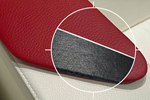Volkswagen unveils hemp fiber-based leather alternative with Revoltech
Bio-based surface material made from industrial hemp is being developed and tested for possible use in Volkswagen vehicles from 2028 onward.
Volkswagen (Wolfsburg, Germany) has entered into a cooperation with the textiles manufacturer startup Revoltech GmbH (Darmstadt, Germany) to research and develop sustainable materials based on industrial hemp — specifically, a substitute for imitation leather. These could be used as surface materials in Volkswagen models starting in 2028.
The leather alternative is made from 100% bio-based hemp cultivated for the food industry. It is an all-natural, single-layer surface material called LOVR (“leather-free, oil-free, vegan and residue-based”) that is being developed specifically with the automotive industry in mind. It can reportedly be produced in existing industrial plants and recycled or composted at the end of its service life. The hemp fibers and a fully bio-based adhesive are combined using a distinctive technology and processed to become a surface material.
According to Kai Grünitz, Volkswagen brand board member for technical development, “In our search for new materials, we are very open to new ideas from many different industries. At Technical Development, we place a strong focus on innovative, creative and sustainable solutions for holistic, resource-saving vehicle development.”
Moreover, the cooperation between Revoltech and Volkswagen provides a good example of benefits gained when startups and established companies work together using their respective strengths.
Volkswagen’s Materials Technology, Design and Components Development departments, Volkswagen Group Innovation and Revoltech are combining know-how to include as many perspectives as possible in the material’s development. Potential applications are being identified in collaboration with Components Development. The material has received very positive feedback in customer surveys.
Related Content
-
Robotized system makes overmolding mobile, flexible
Anybrid’s ROBIN demonstrates inline/offline functionalization of profiles, 3D-printed panels and bio-based materials for more efficient, sustainable composite parts.
-
Bcomp ampliTex makes appearance in Cupra EV Cup Bucket seats
The entire Cupra Born VZ line-up features all-natural fiber front seats that highlight functionality, aesthetics and reduced CO2 emissions.
-
Flax composites enter serial automotive production via Volvo EX30
The small SUV, which focuses on sustainability and is designed to have the lowest carbon footprint of any model in Volvo Cars’ history, incorporates Bcomp ampliTex fibers in its dashboard and door trim.

















